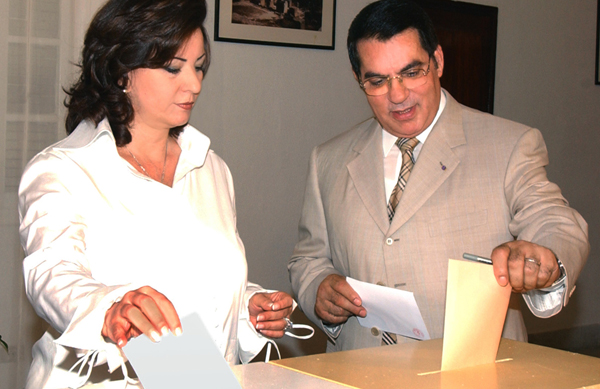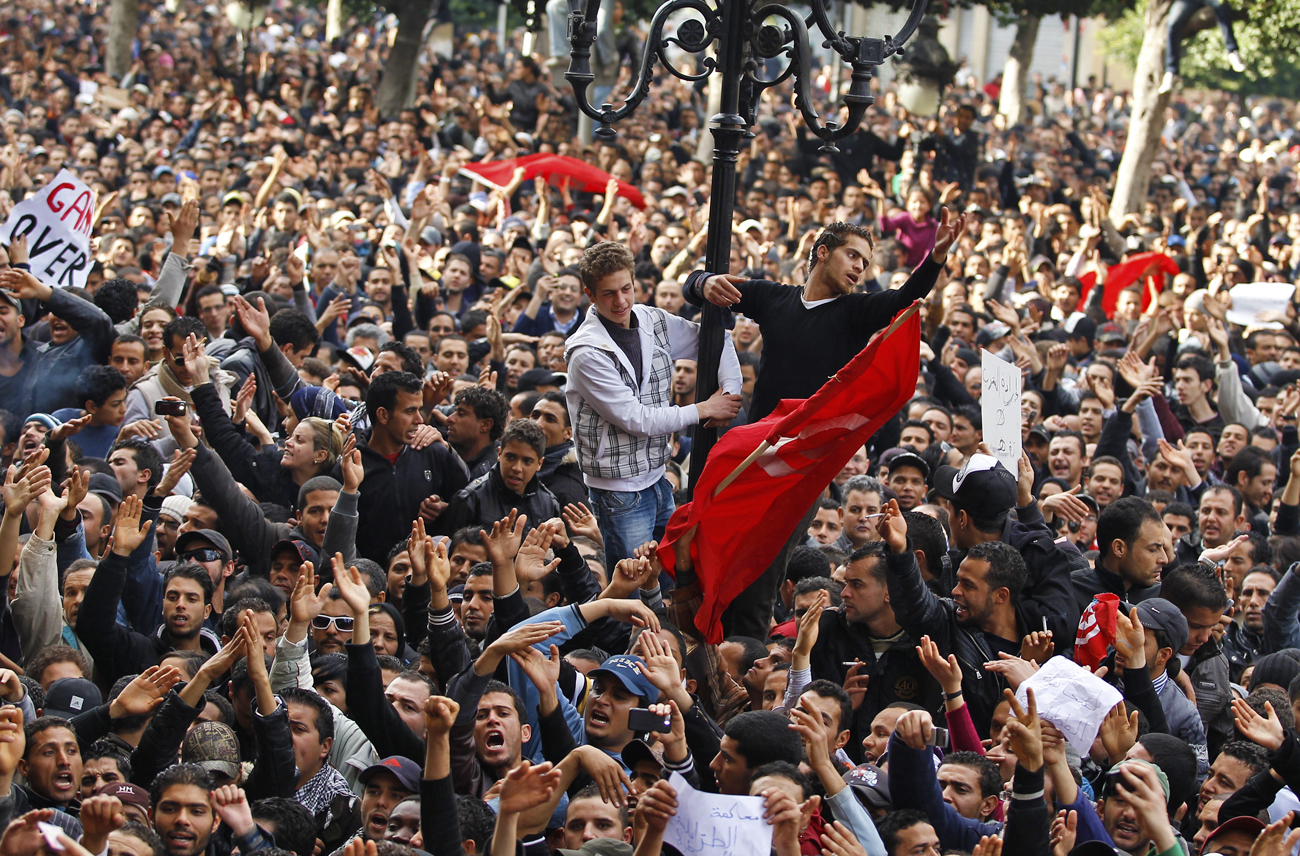The Twitterati were like Africa’s mythical harbinger of ill-fortune and death, the hornbill. “If it perches on a tree near a village so as to overlook the village and utters its deep bass booming note, someone in the village is sure to sicken and die within a few days,” Scottish anthropologist/folklorist Sir JG Frazer wrote nearly a century ago.
The tweets from Tunisia whispered of a coup well before the Western media caught on – and perhaps before foreign embassies or even the Tunisian government itself fully understood the portents. At first Western embassies spoke of isolated, small demonstrations on their travellers’ advisory websites, but didn’t actually warn visitors no to go to Tunisia, and so thousands of tourists were still in the country as events took their decisive turns.
Watch: Tunisian military tries to restore peace, by Al Jazeera.
Curiously, but perhaps presciently, Tunisia’s American PR crew, the Washington Media Group, fired its Tunisian government paymaster a week before President Zine el–Abidine Ben Ali was forced from the country. Writing to the Tunisian government, the PR firm said:
“It has been and remains our view that improving your nation's image in the US or elsewhere can only be accomplished if the reputation sought is consistent with the facts on the ground.
“Recent events make it clear the Tunisian government is not inclined to heed our counsel regarding meaningful reforms. Indeed, the government's current actions and activities have undermined, or in some cases completely undone, whatever progress we made in improving Tunisia's reputation. For these reasons, and because we are troubled by your government's apparent approach to important civil rights and civil liberties issues, Washington Media Group terminates its contract effective immediately.”
Somebody at WMG was paying close attention to those hornbill-like tweets from Tunis.
In fact, for a full month the protests raged on in the country’s provincial cities and moved closer and closer to the capital where Ben Ali had been in charge for 23 years, after having seized power from the then-ailing president Habib Bourguiba. On 17 December in the town of Sidi Bouzid, an unemployed university graduate, Mohamed Bouazizi, set himself alight in protest against the Tunisian situation, before succumbing to his injuries. With hindsight, Bouazizi’s act seems to have galvanised anger over rising basic commodity prices, unemployment, a lack of freedom of expression and political repression into a series of increasingly vigorous demonstrations against the regime. In anger, protesters eventually sacked the president’s seaside home, downtown stores, government buildings and other public facilities. The protests eventually culminated late last week in Ben Ali’s resignation and flight into exile in Saudi Arabia.
For some, Ben Ali is WikiLeaks’ first victim. The disclosures on WikiLeaks seem to have been an important element in fuelling Tunisian anger with descriptions of the Ben Ali lifestyle and business nous after they spread throughout Tunisia via social networking and other internet avenues. In the cables, American diplomats vividly expressed their astonishment and disgust at the sybaritic lifestyle and avaricious business behaviour of the Ben Ali family and his friends, especially relatives of his second wife, Leila, a former hairdresser.

Photo: Tunisian President Zine al-Abidine Ben Ali and his wife Leila vote in a Tunis poling station October 24,2004. President Ben Ali, then in power for 17 years and accused by critics of seeking a presidency-for-life, won a fourth five-year mandate. Poor quality from source. REUTERS.
One cable from 2008 coyly titled: “What’s Yours Is Mine,” reported, “Although the petty corruption rankles, it is the excesses of President Ben Ali’s family that inspire outrage among Tunisians. With Tunisians facing rising inflation and high unemployment, the conspicuous displays of wealth and persistent rumours of corruption have added fuel to the fire.”
The protests gained strength through social networks, reinforced by Al Jazeera's daily coverage, which had been on the story weeks before Western media paid heed.
Some 15 years ago The Economist called the early use of email and SMS in building momentum of political protests “the electronic swarm”. This paralleled The New York Times columnist Tom Friedman’s catchy depiction of investment fund managers’ lightning-quick responses to international political and economic developments as the “electronic herd”. The protests in Tunisia could be described as the first real flowering of the “electronic mob”.
In fact, this seems to be the first time a populace – as opposed to a political rival or military clique – has run the rascals out of town in the Arab Middle East (unless you count Lebanon’s somewhat anomalous experience a few years ago). And so, regimes across the Maghreb and into the rest of the Middle East are keeping a close watch on how this evolving story in Tunisia turns out. Nearby regimes are run by small oligarchies of aging politicians and military officers, plus an occasional sclerotic royal family surviving against potent populist forces and especially versions of divisive religious nationalism.
As a result, anything that evens the odds against the virtual monopoly of force by a state may have profoundly unsettling – and unpredictable – effects in the region. Perhaps for that reason, Libya’s durable leader and would-be transnational Arab nationalist, Muammar Qaddafi, has criticised Tunisia’s citizens for effectively overthrowing their betters. The Stuart’s Charles I or the Bourbon’s Louis XIV would have understood this completely.
Settled by Phoenicians in ancient times, Tunisia was home to Hannibal, the finest general of Rome’s great Mediterranean antagonist, Carthage. After the Romans conquered it and ploughed Carthage with salt, the land became the Roman province of Afriqa, the great breadbasket of the classical world. It was also whence came the priest who became St Augustine at the twilight of the Roman Empire. Then the Vandals conquered the region and behaved like, well, vandals.
Successively conquered by the Byzantines, the Arab Islamic armies and then fought over by Spaniards and Ottomans, Tunis was finally seized by France in 1881, after the Bay of Tunis’ government declared bankruptcy.
In World War II Tunisia was the American Army’s bloody nose in the Battle of the Kasserine Pass, and followed by the German defeat at the hands of the US and Britain. After independence, Tunisia’s founder president Habib Bourguiba (in a path later followed by Ben Ali) abolished the monarchy and supported a brand of modernist Islam that put women’s rights in place and ended polygamy. The Tunisian government focused on improving education, building a modern export–orientated, industrial economy, and encouraging foreign investment in manufacturing and petroleum production and tourism, as well as economic integration with Europe.
In effect, Tunisia became the antonym of Algeria’s internecine civil strife or Egypt’s economic stagnation. But it all came at a cost – the country ranked near the bottom of indices of freedom of expression, media freedom and political liberty, and the creation of an increasingly well-educated, younger generation which chaffed at such restrictions and the lack of upward opportunities. Meanwhile, the country’s police rounded up potential opponents of the regime and kept a tight lid on open discussion. By the time Ben Ali’s regime took over from Bourguiba, the tide of corruption was coming in hard and fast as well, further fuelling antagonism and resentment.
The new instability now poses challenges not only for Tunisia, but for the broader region. In an attempt to hold on, Ben Ali even promised early, more open elections, and offered not to run for president again, Finally, he had no option but to yield when the civil unrest didn’t end.
Foued Mebazaa, the speaker of parliament, has now taken over as interim president from prime minister Mohammed Ghannouchi, who had first claimed to be in charge when Ben Ali gave up. Mebazaa has proposed elections in two months and there are signs that one of the figures jockeying for a new job may be army commander General Rachid Ammar. Via Facebook, for example, Tunisians are clicking the “Like” icon on “General Rachid Ammar President”.
And, in fact, it seems as if the real power centre now is in the hands of the country’s army, not its politicians or street mobs. A state of emergency is in place and troops patrol the capital while helicopters range in the airspace above. Looking ahead, a salutary caution about the evolution of things must be in the minds of many. Recall, for example, what happened in Iran after the shah was deposed – the radical left and their student allies were replaced by an angry religious nationalism that remains in power today.

Photo: Which one of them will be next? Then Tunisia's President Zine al-Abidine Ben Ali talks with Qatar emir Sheikh Hamad bin Khalifa al-Thani, Algeria's President Abdelaziz Bouteflika and Syria's President Bashar al-Assad (front row, 2nd L-R) as he stands next to Libya's leader Muammar Gaddafi (front row, L) as they pose for a family photograph at the Arab League summit in Sirte March 27, 2010. Gaddafi hosted the summit in his hometown of Sirte. Arab League Secretary General Amr Moussa (back row, L) and Saudi Foreign Minister Prince Saud al-Faisal (back row, 2nd R) stand in the back row. Egypt's Mubarak is not in the picture, but could easily be the first to follow Ben Ali. REUTERS/Zohra Bensemra
And so, as a result of the current confusion, regimes in Tunisia’s Maghreb neighbours, the Persian Gulf emirates, Saudi Arabia, Syria, Jordan and Turkey are almost certainly watching very carefully as Tunisia’s political and social fabric unravels. In Egypt people are already sending SMSes reading “Mubarak, oh, Mubarak, your plane is waiting for you!” and putting the Tunisian flag to their Facebook pages. In Algeria, perhaps in an attempt to emulate Bouazizi, a young man burned himself, sparking protests in provincial towns some 700km from the capital.
Economically, Tunisia will also take some real hits, despite the desires of the protesters that toppled the regime. Tunisia’s tourist industry is in tatters and its supply-chain subcontracting for manufacturing products from clothing to aircraft parts will get a black eye as long as the uncertainty continues. The results of all this will not be good news for Tunisia’s neighbours either, at least not in short term.
Further afield, despite having to hold its nose over the Nero-esque excesses of the Ben Ali regime – what with its caged, pet tigers, villas festooned with real Roman antiquities and banquets replete with desserts flown over from the French Riviera – the US had become comfortable with Tunisia’s role as a moderate in the Arab-Israeli struggle, and with its open economy (albeit with an absolutist political tradition) as a model for other states in the region.
Of course, the question now is what next? In its most recent issue, The Economist argues that, “For many Arabs, it is easy to draw similarities between the Tunisians’ lot and their own. In Egypt protesters gathered outside the Tunisian embassy chanting ‘Mubarak next’ and ‘Ben Ali, tell Mubarak a plane is waiting for him too!’ The trade and industry minister, Rachid Mohammed Rachid, has ruled out a ‘Tunisia scenario’ in Egypt, but many columnists and political activists disagree.
“In Jordan too, thousands of protesters took to the streets in protest over rising food and commodity prices, unemployment and poverty. The Muslim Brotherhood has warned that the proposed price hikes will spark protests similar to Tunisia’s in Jordan. So far, most of the anger seems to be directed at Samir Rifai, the Jordanian prime minister, and there has no violence or arrests.
“But that may yet change, particularly given the role of social media….”
While The Economist argues that it is still too early to label Tunisia’s a “Twitter revolution”, the journal agrees that the combination of old and new media is a force that could sweep across the region and undermine the ability of authoritarian regimes to restrict the information available to citizens. The Economist concludes that the most troubling point is the swiftness with which Tunisia switched from being what nearly everyone thought was a stable, calm (albeit repressive) state just a few short weeks ago. Now that thought should keep a lot of people awake in many presidential mansions and foreign ministries around the world. DM
For more, read The Economist, The New York Times, The New York Times, The New York Times, The New York Times, The New York Times, The New York Times, The New York Times, The New York Times, Reuters, BBC, BBC, BBC, AP, Time, The Washington Post, The Washington Post, Foreign Policy, Foreign Policy, Foreign Policy and Mother Jones.
Photo: Protesters demonstrate against Tunisian President Zine al-Abidine Ben Ali in Tunis January 14, 2011. REUTERS/Zohra Bensemra





